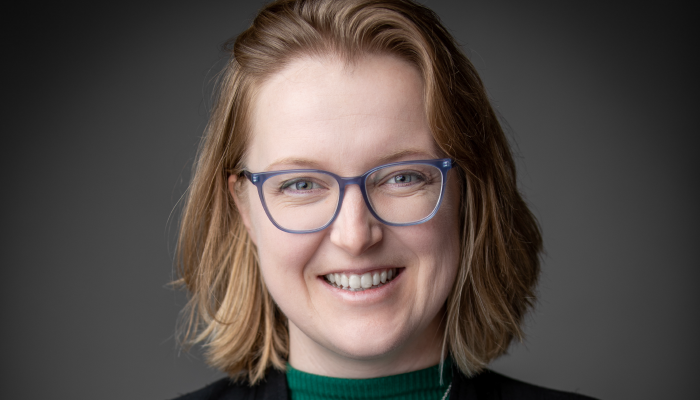
Headshot supplied by Cassandra Thiel
Our new online series sees key opinion leaders in the ophthalmic space discuss how they are addressing the pertinent issues in ophthalmology and sustainability.
In this installment of our online series discussing the pertinent issues in ophthalmology and sustainability, President and CEO of Clinically Sustainable Consulting, Cassandra Thiel, speaks about her research into quantifying the emissions of ophthalmic medical devices and procedures and what kinds of policy changes, practice changes, and initiatives should be implemented to see medical practices become more resource efficient.
What is your involvement in working towards sustainability in ophthalmology?
I conduct research quantifying the emissions of medical devices and procedures. I've done some life cycle assessments and carbon footprints in ophthalmology. We've assessed waste and environmental emissions of a variety of procedures, but I've mostly worked on cataract surgery. I've analyzed resource-use and emissions from cataract surgeries all over the world!
I started with Aravind Eye Care System in southern India, which was able to conduct phacoemulsification with only 5 percent of the greenhouse gas emissions of the UK. Then I partnered with a great team to create a tool called Eyefficiency, which allows surgical teams worldwide to benchmark and monitor their productivity, costs, carbon emissions, and waste generation during cataract surgery.
Today, my research still often involves eye care. My lab is wrapping up a large study where we tried to understand the barriers to enacting sustainability initiatives in an academic eye center. We had a legal team from Temple University review federal and state regulations; they found no hard laws prohibiting most of the sustainability interventions we recommended. We also interviewed health system stakeholders, asking them what they thought about specific interventions – such as removing draping on the back tables or using small face drapes instead of full body drapes. Some staff were concerned about infection control, but the infection control officer said these were all aligned with facility policy.
What are the most urgent sustainability priorities in the field?
Action. We need to stop wasting so many resources and just get moving. Some of the changes are practice changes (I recommend this article about how ophthalmologists can decarbonize eye care) and some of them are policy changes (like sending patients' drugs home with them).
Manufacturers also need to focus on changes like creating circularity with their products and reducing wasted items. EyeSustain has a great partnership with a variety of “players” in the field, to help overcome political barriers for manufacturers in using electronic instructions for use.
Initiatives with other stakeholders – such as governments and standards-setting bodies – should also be considered to enable and support medical practices becoming more resource-efficient.
What has advanced in terms of how practitioners and the industry have addressed sustainability in the last decade?
The whole healthcare space is much more aware of sustainability issues than they ever were. Unfortunately, this may be because we are beginning to see the adverse impacts of climate change. There is much more research that shows us how health care can be improved, and this awareness is crucial for getting actual change in place.
Sustainability is a topic that seems ubiquitous at events and meetings. But how genuinely is ophthalmology invested in it?
I don't necessarily think it's ubiquitous yet, but I'm a sustainability engineer. When people stop asking me "Why?" when I describe what I do, or even better, when they stop responding to my work with "Good luck!" then I'll be happy. I think ophthalmologists have been more invested in this space than other specialties.
I don't know exactly why, but I get the feeling there is some professional resentment at being reprimanded by groups like the Joint Commission, and being forced to switch to single-use items or fully autoclaving all surgical items.
We know that ASCs (ambulatory surgery centers) tend to be more resource efficient than hospital outpatient departments, and I suspect that ophthalmologists tend to have greater ownership in their surgical practice than other specialties, which means they are more aware of the prices from not being more resource-efficient.
I think we need broad global buy-in, but not everyone has to care about it. You need just enough people to change the system, so that people who don't care go about their lives already doing the most sustainable things. We want to make it hard to not be sustainable.
How can all ophthalmology stakeholders work together to reach goals in sustainability?
I think the EyeSustain group is a great example. They have a few subcommittees specifically to engage with these other stakeholders (like policy-makers, accrediting bodies, other professional societies, and federal organizations like the FDA).
The key is to not view other stakeholders as adversaries – yes, manufacturers are trying to make money, but they also have a vested interest in becoming more sustainable. We all have some common goals here, we just have to find the ones we can work on together.
What would you like to see the profession achieve in the next 5-10 years?
I'd love to see every practice reduce resource consumption and waste generation – perhaps to Aravind Eye Care's level!
Cassandra Thiel is the President and CEO of Clinically Sustainable Consulting, and an assistant professor at New York University, the Tandon School of Engineering’s Department of Civil and Urban Engineering, and the Grossman School of Medicine’s Departments of Population Health and Ophthalmology.
